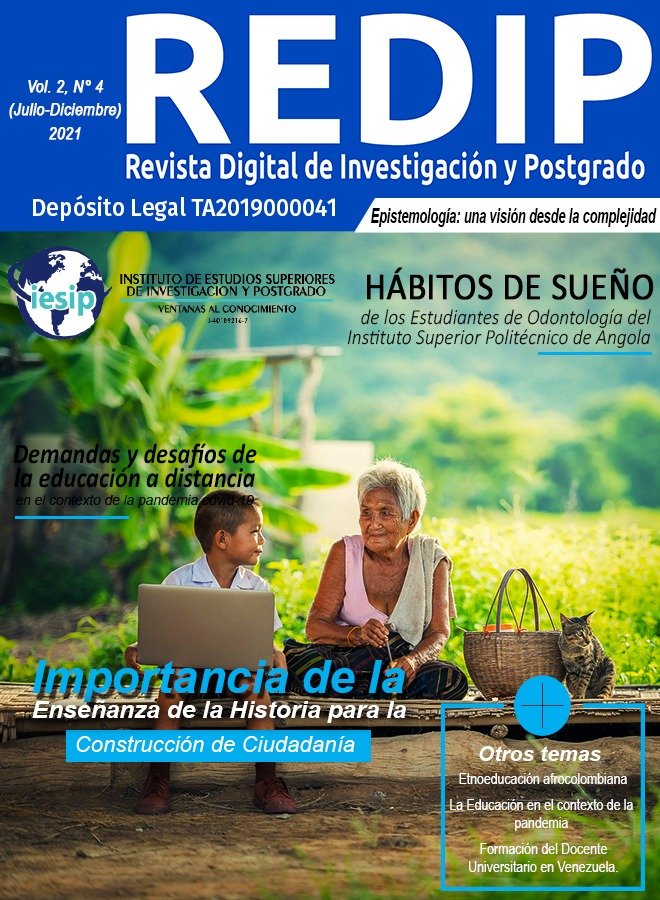Education in the context of the pandemic
Challenges and possibilities for development
DOI:
https://doi.org/10.59654/rjqm8k05Keywords:
Education, pandemic, pedagogy of the exception, emergent pedagogy.Abstract
The purpose of this article is to reflect on how the Covid-19 pandemic has impacted educational development in the context of the Department of Arauca, as well as the pedagogical practice of primary and secondary basic education teachers, with special
emphasis on the public educational institution "Filipinas" located in the municipality of Tame, in the Department of Arauca, Colombia, which is made up of a rural population. From the theoretical perspective, it was based on the contributions of Rivas (2020) with reference to the pedagogy of excellence; the emerging pedagogy Adell and Castañeda (2012); pedagogical strategies, Picardo, Balmore, and Escobar (2004);
teaching strategies, Monereo (1999), the massification of connectivity based on mobile Internet and the increase of more accessible digital devices, Trucco and Palma (2020). Based on the above, the following question arose: What are the challenges facing education in the department of Arauca, Colombia in the context of the pandemic, as well as its possibilities for development? It concludes that in the framework of new educational proposals, derived from the educational model that the situation of both the pandemic and what could be considered as the post-pandemic, virtuality is privileged and in this sense, teaching strategies acquire great importance; which
are designed with the purpose of solving problems related to educational practice and involve a planning process in which the establishment of sequences of actions is produced, with a flexible character and are oriented towards an end that is to be achieved.
Downloads
References
Adell, J. y Castañeda, L. (2012). Tecnologías emergentes ¿pedagogías emergentes? En: J. Hernández, M. Pennesi., D. Sobrino y A. Vásquez. (Coords.). Tendencias emergentes en educación con TIC. Barcelona: Asociación Espiral, Educación y Tecnología. Pp. 13-32. https://digitum.um.es/digitum/bitstream/10201/29916/1/Adell_Castaneda_emergentes2012.pdf
Domínguez, L., Vega, N., Espitia, E., Sanabria, A., Corso C., Serna, A. y Osorio, C. (2015). Impacto de la estrategia de aula invertida en el ambiente de aprendizaje en cirugía: una comparación con la clase magistral. Biomédica, 35(4) ,13-21. https://revistabiomedica.org/index.php/biomedica/article/view/2640
Monereo, C. (coord.)., Castelló, M. Clariana, M., Palma, M., Pérez, M. L. (1999). Estrategias de enseñanza y aprendizaje. Grao.
Picardo, J., Balmore, P. y Escobar, B. (2004). Diccionario Enciclopédico de Ciencias de la Educación. El Salvador, San Salvador: Print Book.
Rieble-Aubourg, S. y Viteri, A. (2020). Covid-19: ¿Estamos preparados para el aprendizaje en línea? Nota CIMA, N° 20. Washington, D.C., Banco Interamericano de Desarrollo (BID) https://publications.iadb.org/publications/spanish/document/Nota-CIMA--20-Covid-19-Estamos-preparadospara-el-aprendizaje-en-linea.pdf.
Rivas, A. (2020). Pedagogía de la excepción. ¿Cómo educar en la pandemia? Universidad de San Andrés.
Trucco, D. y A. Palma (eds.) (2020). Infancia y adolescencia en la era digital: un informe comparativo de los estudios de Kids Online del Brasil, Chile, Costa Rica y el Uruguay, Documentos de Proyectos (LC/TS.2020/18). Santiago, Comisión Económica para América Latina y el Caribe (CEPAL).
Unesco. (2015). Repensar la educación. ¿Hacia un bien común mundial? París, Unesco.
Downloads
Published
Issue
Section
License
Copyright (c) 2024 Revista Digital de Investigación y Postgrado

This work is licensed under a Creative Commons Attribution-NonCommercial-ShareAlike 4.0 International License.
Esta licencia permite a los reutilizadores distribuir, remezclar, adaptar y desarrollar el material en cualquier medio o formato únicamente con fines no comerciales, y solo siempre que se atribuya al creador. Si remezclas, adaptas o construyes sobre el material, debes licenciar el material modificado bajo términos idénticos. CC BY-NC-SA incluye los siguientes elementos:
![]() POR: se debe dar crédito al creador.
POR: se debe dar crédito al creador.![]() NC: Sólo se permiten usos no comerciales de la obra.
NC: Sólo se permiten usos no comerciales de la obra.![]() SA: Las adaptaciones deben compartirse en los mismos términos.
SA: Las adaptaciones deben compartirse en los mismos términos.











